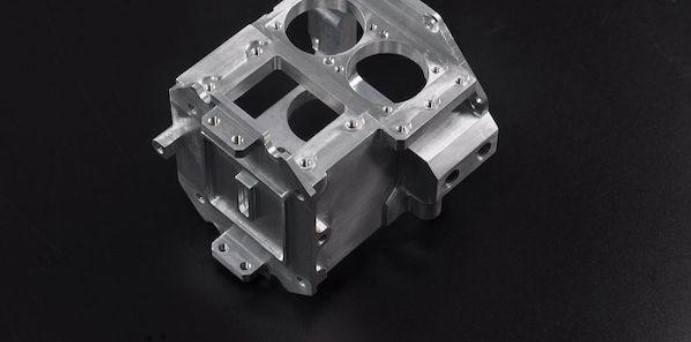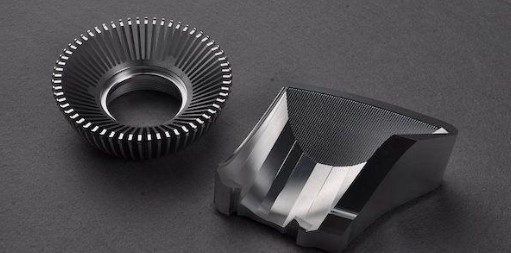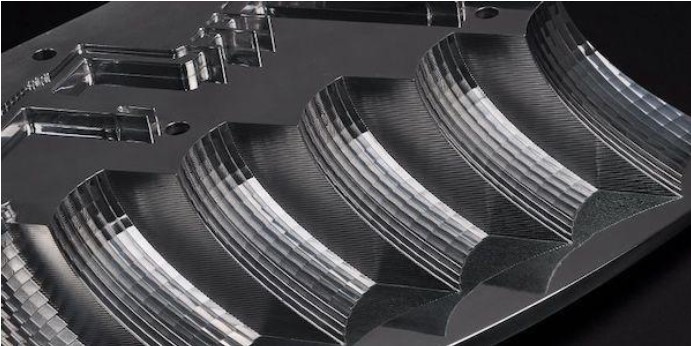Machining operations typically begin with squaring off blanks before proceeding to machine specific part features. Ensuring uniformity among workpieces in a production line is crucial to avoid machining errors and automation failures caused by dimensional variances. While this step is necessary for precision machining service, it can be time-consuming and act as a bottleneck, hindering overall throughput.

To address this bottleneck, some manufacturers opt for a solution involving precision blanks that are pre-machined and ground by a specialized supplier.
Precision blanks are specialized pre-machined materials that significantly reduce the preparation work required on machine centers. These blanks are precisely shaped, with tight tolerances and smooth finishes, allowing manufacturers to optimize production processes and achieve higher efficiency.
Machine-Ready Blanks
Machine-ready blanks are pre-machined materials designed to streamline manufacturing by reducing the need for in-house material preparation. Manufacturers can order these blanks directly from specialized suppliers. This direct sourcing approach reduces lead times and minimizes material waste, as the blanks are already tailored to the required specifications.

The use of machine-ready blanks is particularly advantageous in high-production environments where efficiency is paramount. By reducing setup time, tool changes, and manual adjustments, these blanks enable machine centers to focus solely on value-added machining operations. As a result, manufacturers can significantly increase spindle uptime and throughput, leading to higher output and lower production costs.
Another significant benefit of precision machined parts is their versatility. These blanks are available in various materials, including metals like aluminum, steel, brass, and titanium, as well as engineered plastics. They can be customized to match specific part geometries, making them suitable for various applications across different industries.
Precision is a critical aspect of machine-ready blanks. Suppliers employ advanced metrology and quality control measures to ensure that the blanks meet the required tolerances and surface finish. This precision allows manufacturers to achieve accurate and repeatable results in their machining processes, improving the overall quality of the end products.
Furthermore, precision machined parts can be designed with additional features already machined, such as holes, pockets, and contours. This approach reduces the need for secondary operations, minimizes the risk of errors, and further streamlines the manufacturing process.
High-Production, Low Automation
In a “High-Production, Low Automation” manufacturing environment, precision blanks play a crucial role in reducing prep work on machine centers. Studies have shown that using precision blanks can reduce dimensional variations by up to 80% compared to manually machined workpieces. This level of consistency leads to more precise and reliable end products, resulting in fewer rejects and rework, ultimately saving production time and costs.
Precision blanks are manufactured using advanced CNC machining processes, ensuring that each blank is produced with consistent dimensions and tight tolerances. This level of precision eliminates the need for manual measurements and adjustments on the machine centers, as the blanks are already engineered to meet the exact specifications required for the specific part or component.
Internal material stress from forging can cause flat parts, especially thin ones with larger surface areas, to deform like potato chips during finish machining, leading to scrap. Machine-ready blanks are stress relieved in the production process to prevent movement and maintain dimensional stability.
Moreover, precision blanks are carefully machined to achieve a superior surface finish. This means that the surface of the blank is smooth and free from irregularities, reducing the need for additional finishing steps such as grinding or polishing. Additionally, using a double-disk grinder for producing precision blanks offers two major benefits. It allows simultaneous grinding of both the top and bottom, reducing residual stress in the material. The process involves the material floating between two grinding discs, ensuring equal material removal from the top and bottom. This releases material stress during grinding, resulting in flat blanks that have a propensity to stay flat due to intentional stress release.
The material properties of precision blanks are well-controlled, ensuring uniform hardness and mechanical properties across all blanks, which in turn optimizes the machining process on the machine centers. Research indicates that precision blanks achieve surface finishes with roughness values of Ra 0.4 micrometers or better. This high-quality surface finish reduces the need for additional surface treatments, saving up to 30% on finishing time.
In traditional manufacturing processes, raw materials often require pre-machining steps, such as cutting, milling, or turning, to achieve the desired shape and dimensions before they can be fed into the machine centers. However, precision blanks are delivered ready for use, eliminating the need for these pre-machining operations. This not only reduces labor requirements but also increases the throughput of the manufacturing process.
Dovetailing Into Milling
Dovetailing into milling refers to the process of seamlessly integrating pre-machined precision blanks into milling operations. This approach optimizes the manufacturing workflow, streamlining the machining process and improving overall efficiency.
Traditionally, milling complex features like dovetail slides requires multiple setups and meticulous alignment, which can be time-consuming and prone to errors. However, manufacturers can significantly simplify this process by using machine-ready precision blanks tailored to fit dovetail specifications.
When using precision blanks for dovetailing into milling, manufacturers can directly load the pre-machined blanks into the machine centers. This eliminates the need for time-consuming tasks such as fixturing, alignment, and redundant machining operations. By starting with blanks that are already pre-machined to precise tolerances, manufacturers can achieve greater accuracy and consistency in the final machined parts.
Moreover, the integration of precision blanks into milling operations reduces the risk of errors caused by multiple setups. Each setup introduces the possibility of misalignments and variations, which can negatively impact the final product’s quality. With machine-ready blanks, manufacturers can maintain the required geometrical accuracy throughout the entire milling process.
Dovetailing into milling also allows manufacturers to optimize tool paths and tool selection. Since the blanks are pre-machined with features like holes, pockets, and contours, operators can choose the most appropriate tools and strategies for the remaining milling steps. This further improves machining efficiency and reduces the overall production time.
Additionally, the use of precision blanks for dovetailing into milling enhances production flexibility. Manufacturers can efficiently switch between different part geometries by selecting the appropriate blank for each specific job. This versatility is particularly valuable for high-mix, low-volume production environments.
Conclusion

Overall, precision machined parts offer valuable advantages in various manufacturing environments. Whether used in high-production, low automation settings, or integrated seamlessly into milling operations, these pre-machined materials streamline workflows, improve consistency, and boost overall productivity. By reducing setup time, minimizing human errors, and optimizing machining processes, precision blanks empower manufacturers to meet increasing demands efficiently while maintaining high-quality standards.
